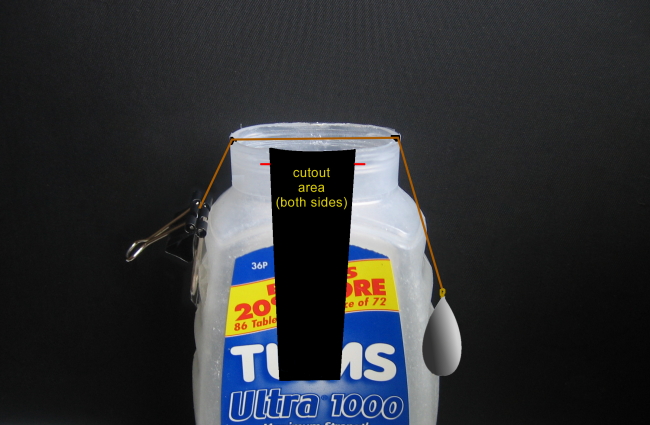Results 1 to 3 of 3
Thread: universal sharpness measurer
-
02-26-2010, 12:39 PM #1
 universal sharpness measurer
universal sharpness measurer
NOTE: I know this will probably be considered borderline heretical by some. Just wanted to put it out there in case anyone finds it interesting. Please don't hit me.
my posts mentioning the idea before here and here
Let me start by saying that I originally got the idea of using thread here. The thing is, this guy was using looped thread, which introduces a few problems and is harder to do in general (at least it was for me).
I also found this recently. While his rig looks much nicer than mine, it uses an approximate method for achieving consistent thread tension. I believe my approach of actually measuring the tension is better. Plus, my rig is made from a Tums bottle.
So, here's my design:

Unfortunately, the initial rigs I made have long since been discarded, and I can't find my Xacto knife right now, so you'll have to use your imagination. The black part on the container represents the plastic you cut away (on both sides of the container). It needs to be about this deep so that you don't whack your blade against the bottom of the cutout when the thread is cut. You also need to cut tiny notches at the top to hold the thread.
Note: the clip and the weight are just for illustrative purposes. Some other kind of clip would work better, and you need a little more weight than that (I used a set of keys).
You put the whole thing on a standard electronic kitchen scale that will display grams, tare it, then slowly push downward on the thread with a blade, noting how many grams are registered when the thread finally gives way.
The beauty of the design is that it doesn't matter how you attach the thread or what kind of weight you use. The ONLY thing that matters is the tension across the top of the container. A good way to measure this is by how much force it takes to deflect the thread 1 cm (you can mark this on the container - similar to the red lines in the picture).
If others build a similar rig and use a standardized type of thread (there are such things, I have read), and if we agree on a good amount of tension, then we have a test that should be the same no matter who is doing it, right? To test this, I built two of these rigs, and any irregularities in the shape of the cutouts, the thread's attachment point, or the weight that I used didn't change the results, so long as the tension was the same.
(I have to admit, I'm kind of excited about the implications of that last sentence!)
My results:
Since my thread is of an unknown origin, any numbers would be absolutely meaningless. However, three things about my testing were promising:
1. Consistency -- with the same amount of tension on the thread, it took pretty much the same amount of force to cut it time after time (using the same razor, of course).
2. Matched with honing -- as I honed a blade sharper and sharper, it took less and less force to cut a thread with it.
3. Matched with shaving -- if I used two different blades during a shave and felt that one shaved better, the better-shaving blade invariably required less force to cut the thread in post-shave testing.
While I can't say that this would yield perfect data for us to compare my super-sharp blade to your super-super-sharp blade (though it might!), I think this could finally give us a solid answer to a newbie's "Is my blade sharp enough?" You'd just say "make this, use this thread, put X amount of tension on it, and tell us what you get."
Pros: fairly easy to make, no shaving of hair, no microscopy, no touching the blade à la the TPT, doesn't require exotic materials or apparatuses, shouldn't damage the edge, and is simple enough for anyone to do regardless of shaving experience.
Cons: requires an electronic kitchen scale (less than $20 at Walmart)
Important caveat: Let me make clear that I'm not suggesting that the ability to cut thread is a perfect indication of shave-worthiness, since there is that vague "smoothness" factor that no one can quite get a handle on. However, I did find enough of a relationship to make this kind of test worthwhile, imo.
Alright, let me have it.
Last edited by northpaw; 02-26-2010 at 12:46 PM.
-
02-26-2010, 01:59 PM #2

Many moons ago there was a thread suggesting mono-filament fishing line. Consistency in the material being the supposed feature of that. I've never tried any material but hair. If all could agree on a material there would be consistency.
Be careful how you treat people on your way up, you may meet them again on your way back down.
-
02-26-2010, 02:59 PM #3At this point in time...




- Join Date
- Jun 2007
- Location
- North Idaho Redoubt
- Posts
- 27,068
- Blog Entries
- 1
Thanked: 13249
This came up some time back from some of the Knife guys, and yes I remember something about fishing line too...


 LinkBack URL
LinkBack URL About LinkBacks
About LinkBacks






 Reply With Quote
Reply With Quote

